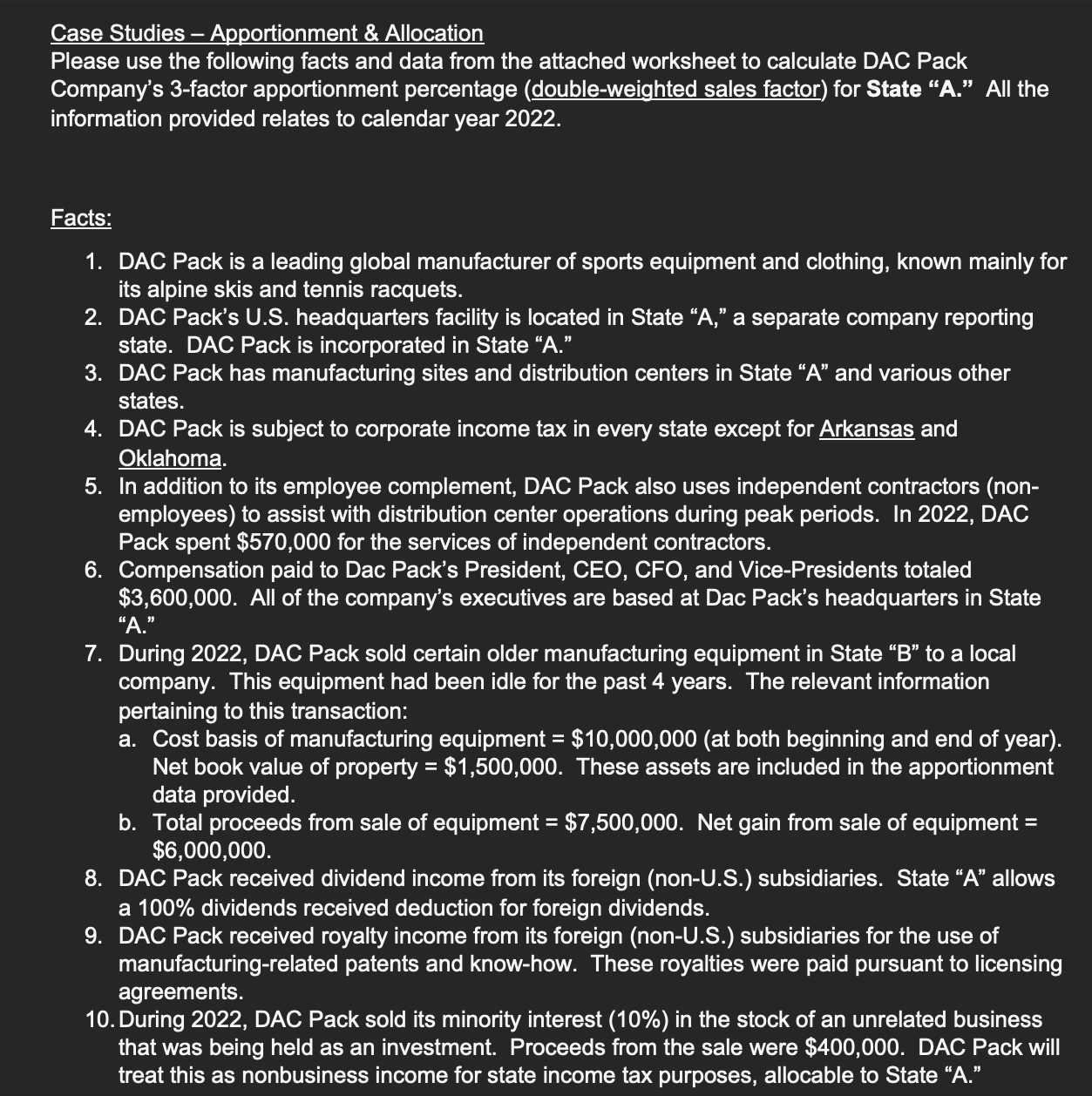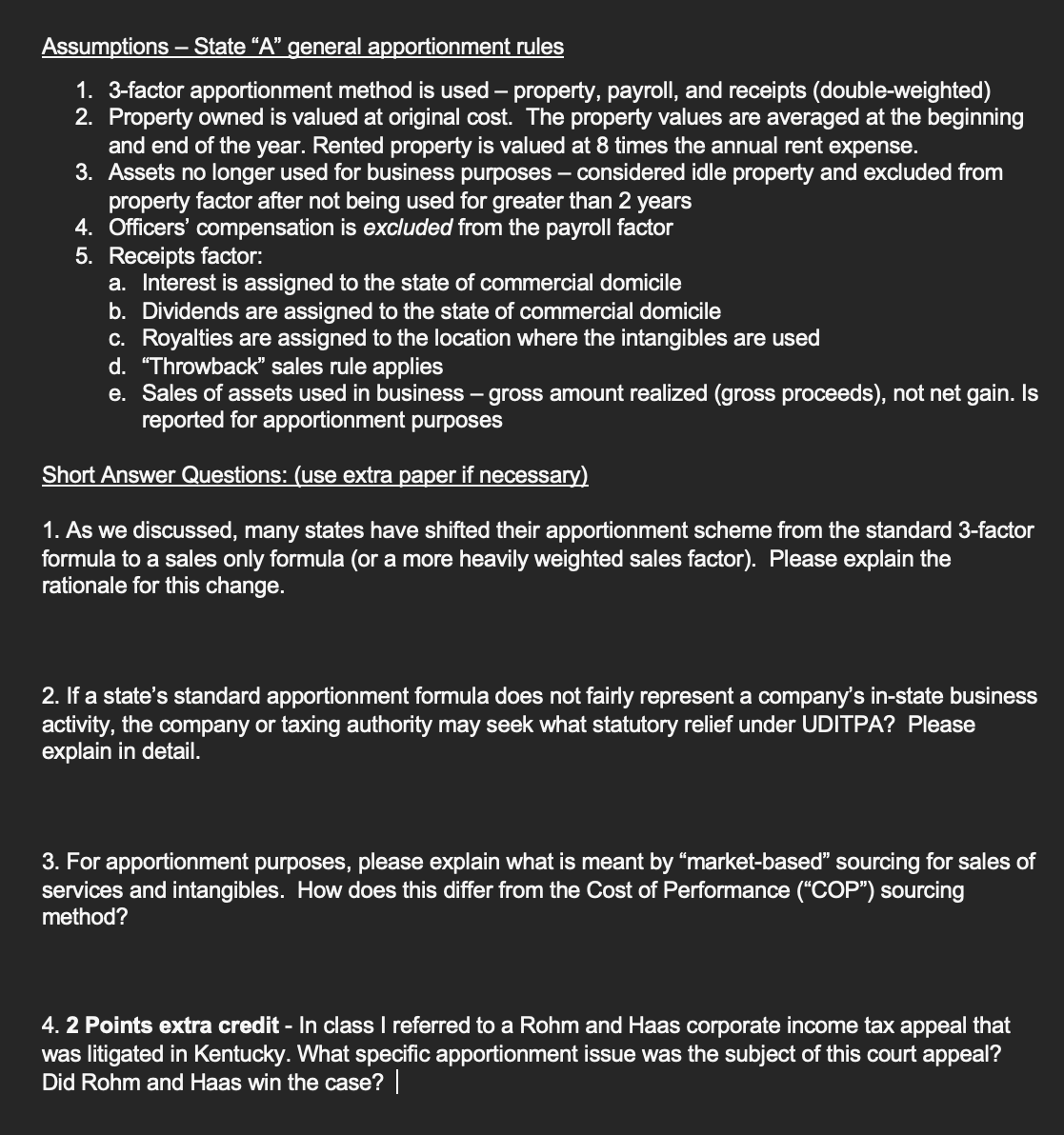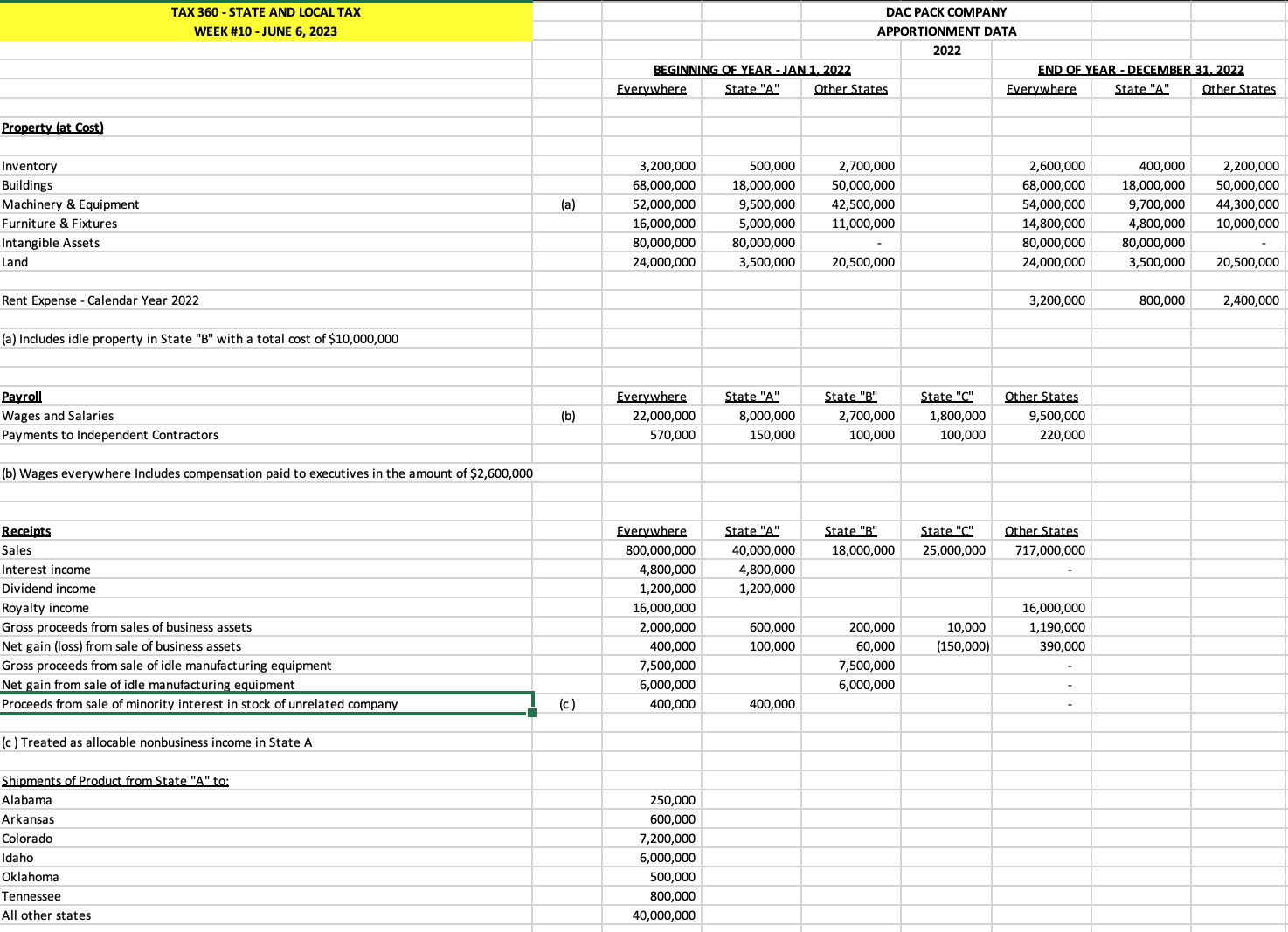Answered step by step
Verified Expert Solution
Question
1 Approved Answer
Case Studies - Apportionment & Allocation Please use the following facts and data from the attached worksheet to calculate DAC Pack Company's 3-factor apportionment percentage


 Case Studies - Apportionment \& Allocation Please use the following facts and data from the attached worksheet to calculate DAC Pack Company's 3-factor apportionment percentage (double-weighted sales factor) for State "A." All the information provided relates to calendar year 2022. Facts: 1. DAC Pack is a leading global manufacturer of sports equipment and clothing, known mainly for its alpine skis and tennis racquets. 2. DAC Pack's U.S. headquarters facility is located in State "A," a separate company reporting state. DAC Pack is incorporated in State "A." 3. DAC Pack has manufacturing sites and distribution centers in State " A " and various other states. 4. DAC Pack is subject to corporate income tax in every state except for Arkansas and Oklahoma. 5. In addition to its employee complement, DAC Pack also uses independent contractors (nonemployees) to assist with distribution center operations during peak periods. In 2022, DAC Pack spent $570,000 for the services of independent contractors. 6. Compensation paid to Dac Pack's President, CEO, CFO, and Vice-Presidents totaled $3,600,000. All of the company's executives are based at Dac Pack's headquarters in State "A." 7. During 2022, DAC Pack sold certain older manufacturing equipment in State "B" to a local company. This equipment had been idle for the past 4 years. The relevant information pertaining to this transaction: a. Cost basis of manufacturing equipment =$10,000,000 (at both beginning and end of year). Net book value of property =$1,500,000. These assets are included in the apportionment data provided. b. Total proceeds from sale of equipment =$7,500,000. Net gain from sale of equipment = $6,000,000. 8. DAC Pack received dividend income from its foreign (non-U.S.) subsidiaries. State "A" allows a 100% dividends received deduction for foreign dividends. 9. DAC Pack received royalty income from its foreign (non-U.S.) subsidiaries for the use of manufacturing-related patents and know-how. These royalties were paid pursuant to licensing agreements. 10. During 2022, DAC Pack sold its minority interest (10\%) in the stock of an unrelated business that was being held as an investment. Proceeds from the sale were $400,000. DAC Pack will treat this as nonbusiness income for state income tax purposes, allocable to State "A." Assumptions - State "A" general apportionment rules 1. 3-factor apportionment method is used - property, payroll, and receipts (double-weighted) 2. Property owned is valued at original cost. The property values are averaged at the beginning and end of the year. Rented property is valued at 8 times the annual rent expense. 3. Assets no longer used for business purposes - considered idle property and excluded from property factor after not being used for greater than 2 years 4. Officers' compensation is excluded from the payroll factor 5. Receipts factor: a. Interest is assigned to the state of commercial domicile b. Dividends are assigned to the state of commercial domicile c. Royalties are assigned to the location where the intangibles are used d. "Throwback" sales rule applies e. Sales of assets used in business - gross amount realized (gross proceeds), not net gain. Is reported for apportionment purposes Short Answer Questions: (use extra paper if necessary) 1. As we discussed, many states have shifted their apportionment scheme from the standard 3-factor formula to a sales only formula (or a more heavily weighted sales factor). Please explain the rationale for this change. 2. If a state's standard apportionment formula does not fairly represent a company's in-state business activity, the company or taxing authority may seek what statutory relief under UDITPA? Please explain in detail. 3. For apportionment purposes, please explain what is meant by "market-based" sourcing for sales of services and intangibles. How does this differ from the Cost of Performance ("COP") sourcing method? 4. 2 Points extra credit - In class I referred to a Rohm and Haas corporate income tax appeal that was litigated in Kentucky. What specific apportionment issue was the subject of this court appeal? Did Rohm and Haas win the case
Case Studies - Apportionment \& Allocation Please use the following facts and data from the attached worksheet to calculate DAC Pack Company's 3-factor apportionment percentage (double-weighted sales factor) for State "A." All the information provided relates to calendar year 2022. Facts: 1. DAC Pack is a leading global manufacturer of sports equipment and clothing, known mainly for its alpine skis and tennis racquets. 2. DAC Pack's U.S. headquarters facility is located in State "A," a separate company reporting state. DAC Pack is incorporated in State "A." 3. DAC Pack has manufacturing sites and distribution centers in State " A " and various other states. 4. DAC Pack is subject to corporate income tax in every state except for Arkansas and Oklahoma. 5. In addition to its employee complement, DAC Pack also uses independent contractors (nonemployees) to assist with distribution center operations during peak periods. In 2022, DAC Pack spent $570,000 for the services of independent contractors. 6. Compensation paid to Dac Pack's President, CEO, CFO, and Vice-Presidents totaled $3,600,000. All of the company's executives are based at Dac Pack's headquarters in State "A." 7. During 2022, DAC Pack sold certain older manufacturing equipment in State "B" to a local company. This equipment had been idle for the past 4 years. The relevant information pertaining to this transaction: a. Cost basis of manufacturing equipment =$10,000,000 (at both beginning and end of year). Net book value of property =$1,500,000. These assets are included in the apportionment data provided. b. Total proceeds from sale of equipment =$7,500,000. Net gain from sale of equipment = $6,000,000. 8. DAC Pack received dividend income from its foreign (non-U.S.) subsidiaries. State "A" allows a 100% dividends received deduction for foreign dividends. 9. DAC Pack received royalty income from its foreign (non-U.S.) subsidiaries for the use of manufacturing-related patents and know-how. These royalties were paid pursuant to licensing agreements. 10. During 2022, DAC Pack sold its minority interest (10\%) in the stock of an unrelated business that was being held as an investment. Proceeds from the sale were $400,000. DAC Pack will treat this as nonbusiness income for state income tax purposes, allocable to State "A." Assumptions - State "A" general apportionment rules 1. 3-factor apportionment method is used - property, payroll, and receipts (double-weighted) 2. Property owned is valued at original cost. The property values are averaged at the beginning and end of the year. Rented property is valued at 8 times the annual rent expense. 3. Assets no longer used for business purposes - considered idle property and excluded from property factor after not being used for greater than 2 years 4. Officers' compensation is excluded from the payroll factor 5. Receipts factor: a. Interest is assigned to the state of commercial domicile b. Dividends are assigned to the state of commercial domicile c. Royalties are assigned to the location where the intangibles are used d. "Throwback" sales rule applies e. Sales of assets used in business - gross amount realized (gross proceeds), not net gain. Is reported for apportionment purposes Short Answer Questions: (use extra paper if necessary) 1. As we discussed, many states have shifted their apportionment scheme from the standard 3-factor formula to a sales only formula (or a more heavily weighted sales factor). Please explain the rationale for this change. 2. If a state's standard apportionment formula does not fairly represent a company's in-state business activity, the company or taxing authority may seek what statutory relief under UDITPA? Please explain in detail. 3. For apportionment purposes, please explain what is meant by "market-based" sourcing for sales of services and intangibles. How does this differ from the Cost of Performance ("COP") sourcing method? 4. 2 Points extra credit - In class I referred to a Rohm and Haas corporate income tax appeal that was litigated in Kentucky. What specific apportionment issue was the subject of this court appeal? Did Rohm and Haas win the case Step by Step Solution
There are 3 Steps involved in it
Step: 1

Get Instant Access to Expert-Tailored Solutions
See step-by-step solutions with expert insights and AI powered tools for academic success
Step: 2

Step: 3

Ace Your Homework with AI
Get the answers you need in no time with our AI-driven, step-by-step assistance
Get Started


